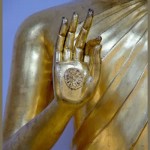4/22 Practice Circle: Mindfulness of Dharmas
 When Practice Circle meets again this Sunday, April 8, at 6 p.m. Pacific, 8 Central and 9 Eastern, we’ll conclude our four-part examination of the Four Foundations of Mindfulness by examining the Fourth Foundation, mindfulness of dharmas. The word dharma, or dhamma in Pali, has a number of meanings, but in this instance it refers to the functioning of the mind, especially the way that our reactivity to our experience creates craving and suffering, and the way in which mindfulness can liberate us from suffering. I’ve shared an excerpt from Beth Ann Mulligan’s book, “The Dharma of Modern Mindfulness,” with which we’ve been working throughout this series,below.Click here to join our free video conference group Sunday night!
When Practice Circle meets again this Sunday, April 8, at 6 p.m. Pacific, 8 Central and 9 Eastern, we’ll conclude our four-part examination of the Four Foundations of Mindfulness by examining the Fourth Foundation, mindfulness of dharmas. The word dharma, or dhamma in Pali, has a number of meanings, but in this instance it refers to the functioning of the mind, especially the way that our reactivity to our experience creates craving and suffering, and the way in which mindfulness can liberate us from suffering. I’ve shared an excerpt from Beth Ann Mulligan’s book, “The Dharma of Modern Mindfulness,” with which we’ve been working throughout this series,below.Click here to join our free video conference group Sunday night!
In class 5 and in examining the factors of the Eightfold Path, we are bringing awareness to more and more areas of our lives and have the opportunity to see things from a different and perhaps wider perspective. The Fourth Foundation of Mindfulness, which is Mindfulness of Dharmas, invites us to bring curiosity and kind attention to everything that may offer us a teaching. The word Dharma literally means the teachings of the Buddha, and it also means life, or all of reality, teaching us. When we learn from our own experiences in life, we can be awakened. What do I mean by awakened? We’re present to our lives, to other living beings, and to the great earth itself, and see clearly our relationship to them and our effect on them. The world teaching us is also Dharma. We may be awakened by our encounter with the sound of the wind, the shadows on a rock, a child’s voice. or even the other people in the same traffic jam we are in, because we have a sense of our interconnectedness. We know we’re not alone, even if we seem to be going in different directions. . . .
Wise effort is another step on the Eightfold Path. Here’s the simplest, most direct way I can describe it: According to the Buddha’s teachings, Wise Effort leads toward freedom, peace and contentment, and away from greed, anger, and ignorance — in short, away from suffering. . .
In MBSR we are inviting Wise Effort right from the beginning. If we are going to put energy into healing through MBSR, it means taking two and a half hours per week for the class and an hour a day for the meditation. That might mean we’re going to have to stop putting energy into other things that do not lead to health and wholeness…
How do we know if our effort is wise? Applying the Four Foundations of Mindfulness:
Mindfulness of the Body lets me know how stressed I really am.
Mindfulness of Feeling Tones and Mindfulness of Mind-Heart States gives me information about where I am mentally and emotionally.
Mindfulness of Dharmas reminds me that all beings suffer, so there is nothing wrong with having a hard day. It happens. And it also reminds me that craving (television, ice cream, a technology fix) leads to more suffering, and from experience (not theory) I realize that there is the possibility of freedom from suffering, a freedom I have tasted many times. The way to enter that freedom is through applying Wise View, Wise Intention, and Wise Effort.
Beth Ann Mulligan

Thankyou Mark, I just came across this site and am very comfortable with it’s principles and aims. Would like to practice with more effort and regularity. Have been associated with the Bhodivarna monetary in Warburton Australia for a few years. Looking for something like is offered here. Thanks Terry
Hi Terry!
Just wanted to pop in and share this post from our Facebook page listing some of the online resources from our New Zealand Dhamma Siblings:
https://www.facebook.com/permalink.php?story_fbid=10155566373491376&id=109054131375
I would suggest hooking up with Ramsey Margolis (google with Secular Buddhism New Zealand and you’ll find im) or SIM (Sydney Insight Meditators) and they can direct you (or you can hook up more directly with them in person) even better than we can.
There’s also a lot of community in Europe, and if that information could be of help, just ask.